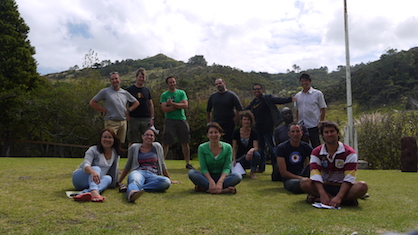Overview
This paper is designed to increase awareness of one's own cultural and internal bias in order to improve cross cultural interaction and health inequalities and to explore issues around rural doctor's involvement towards the end of life. The paper is delivered through a residential workshop conducted on a remote Northland marae and online learning activities.
Who should do this paper?
Any GP or rural hospital doctorworking (or intending to work) rurally will find this paper particularly relevant to their day-to-day practice. Students should be prepared to share and discuss their clinical experience and thoughts in a safe, supportive, and confidential learning environment. This is a 15 point paper that fulfils the requirement of the Academic Component of GPEP2 Programme.
RHM and GP Fellows will also benefit from taking this paper to access up to date evidence based clinical practice.
This paper fulfils the RHM Fellows' triennium CPD programme requirements for both Cultural Competence and Clinical Attachment categories.
Paper Modules
- Communication
- Māori Health
- Health Disparities
- Other Cultures / Cross-cultural Communication
- Wellbeing
- Psychiatry
- Alcohol and Drugs
- Psychogeriatrics
- Palliative Care
- Death and Dying
Paper conveners
- Yan Wong Rural Generalist, Otago
- Jack Haywood, Professional Practice Fellow, Westcoast
Administrator
- Leigh-Ann Moir Dunstan Hospital
Paper structure
The paper is delivered in four components: residential workshop, videoconferences, Moodle, and reading materials.
Residential Workshop
Dates: 23–26 March, Hokianga
Venue: To be confirmed
Start: Thursday 23 March 12:00pm (midday)
Finish: Sunday 26 March, 1:00pm
(Note that there are likely to be evening sessions during the residential. It is not possible to finish night shift on the Thursday morning and participate satisfactorily in the residential).
 Students will be expected to have read at least some of the essential readings for the relevant sessions prior to attending the residential workshop.
Students will be expected to have read at least some of the essential readings for the relevant sessions prior to attending the residential workshop.
Students are expected to bring a short scenario to present verbally to the group (5 minutes), showing either:
A) how communication has (or may have) enhanced or impeded the care of the patient, OR
B) how a patient encounter has shaped your understandings as to what it means to be a doctor.
Accommodation and catering are kindly provided by the marae, on the marae during the workshop. Students are required to contribute to the costs. Accommodation before or after the residential (if required) is to be arranged by the individual students.
Note that it may take most of a day to travel to and from Rawene, Hokianga. Although it is the students' responsibility to arrange transport, there is an opportunity to co-ordinate transport options during the video conference and through Moodle.
Zoom
Zoom is the university's preferred Internet-based video-conferencing platform.
A Zoom video conference IT clinic has been arranged in order to sort out technical issues before the first teaching video conference. It is also a good way to test Zoom and troubleshoot so that you can contribute successfully.
Video conferences (total of 5) will normally be held on Thursday evenings.
Session dates and times are to be confirmed. Attendance at 4 out of the 5 video conferences is required to pass the paper.
- Introduction
- Palliative Care, to be confirmed
- Health Disparities, to be confirmed
- Pacific Health, to be confirmed
- Rural Mental Health, to be confirmed
Moodle
Access Health Sciences Moodle here.
Moodle is the university's preferred platform for interactive internet based teaching. This is used extensively through the semester.
Course resources, announcements, and case based discussion forums are accessed through Moodle. Students can also share resources on Moodle.
Click here to see a demonstration of Moodle
Readings / resources
We have tried to include readings that are thought-provoking and will challenge the values that underpin your practice, and some which are broader in scope than traditional medical academic readings.
Term requirements
- Attend in entirety the compulsory residential workshop
- Participate in 3 out of 4 the teaching videoconferences
- Contribute weekly to Moodle
Assessment
Participation
Overall quality of participation in the course will be assessed.
Written assignment
A reflective essay based on a student's own experience on the theme of death and dying of 2,000 to 3,000 words, discussing the issues faced by rural clinicians. Must include communication and cultural consideration in its broadest sense.
Examination
A case-based, short-answer online exam will be run via Moodle
Important dates
- 23-26 March 2023 residential workshop
- Online written examination, June
- Written assignment due, June
Enrolment
To enrol in this paper, please contact the Rural Postgraduate Programme administrator: